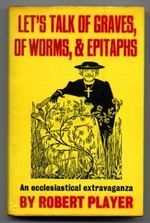Friday's Forgotten Books - Let's Talk of Graves, Worms and Epitaphs
 Robert Furneaux Jordan (1905–1978) was an English architect, architectural critic for The Observer, taught as Hoffmann-Wood Professor of Architecture in the University of Leeds and was a visiting Professor of Architecture at Syracuse University in the U.S. If you conduct a bibliographical search under his given name, you'll find he penned the nonfiction reference books A Concise History Of Western Architecture and Victorian Architecture, among others.
Robert Furneaux Jordan (1905–1978) was an English architect, architectural critic for The Observer, taught as Hoffmann-Wood Professor of Architecture in the University of Leeds and was a visiting Professor of Architecture at Syracuse University in the U.S. If you conduct a bibliographical search under his given name, you'll find he penned the nonfiction reference books A Concise History Of Western Architecture and Victorian Architecture, among others.In 1945, Jordan published a detective novel under the pen name Robert Player, and eventually wrote four more standalone mystery novels over the next 32 years. In the Foreword to the Black Dagger edition of Player's novel Let's Talk of Graves, of Worms and Epitaphs, author and past Crime Writers Assocation Chairman Robert Richardson noted that Player's name rarely appears in standard works about the genre, but "there is an inescapable feeling that, had he devoted himself to writing, he would be recognized as, if not a master, then certainly a gifted and entertaining talent. Literate and ingenious, his books have originality and a capacity to attract."
The novel opens with the line, "It is not every man whose father was both a pope and a murderer." The pope in question is Barnabas Barbellion, a distinguished Anglican clergyman who converted to Catholocism and later became Pope Paschal the Fourth. But years prior, Barbellion was married with two children and also having an affair with Philippa, the wife of his neighbor, Harold Gatsby. When Gatsby is poisoned to death at a croquet party, Philippa is accused of the murder a sensational trial ensues, but no one dares to connect the case with the fact that Barbellion's ailing wife had also died suddenly, except for the narrator, Barbellion's son Augustine Xavier.
The title of the novel is taken from Shakespeare's play Richard II about the British king whose greed, thirst for greater power and disdain for both friends and subjects prove to be his undoing. Despite the darkness of that tragedy, Player's novel is actually rather wickedly funny satire, chock-full of intricate details and tricky plotting and character development that culminates in a twist ending. The density of the writing can bog a bit at times, and it's not the type of book that makes for a quick read, but if you're a fan of historical mysteries and religious lampoonery, Player's novel may be to your taste.





Published on October 26, 2012 05:53
No comments have been added yet.



